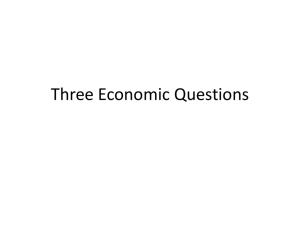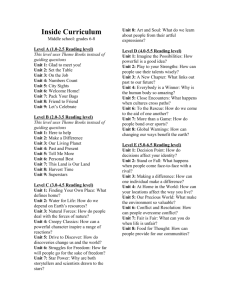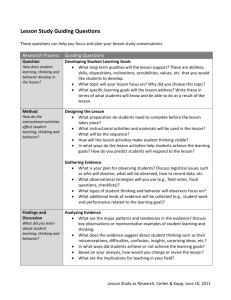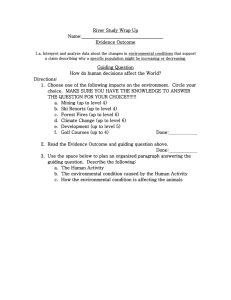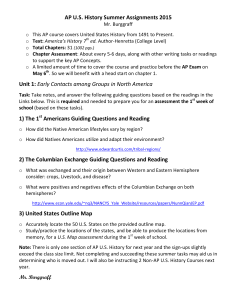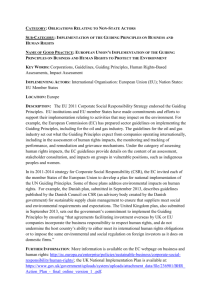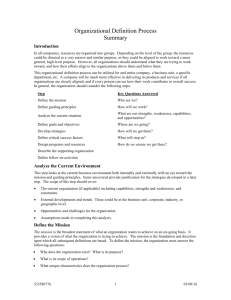Presentation - Economics of Needs and Limits
advertisement
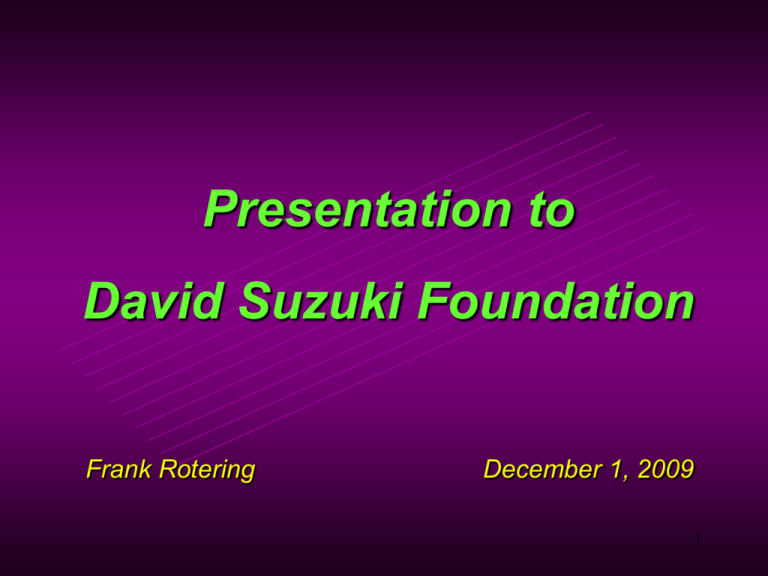
Presentation to David Suzuki Foundation Frank Rotering December 1, 2009 1 Stein Valley Festival, 1989 2 "Economists are stupid they focus on growth and free trade but completely ignore natural limits." Stein Valley Festival, 1989 3 Computer class Simon Fraser University 4 Two main questions: • Is the economy at the root of the environmental crisis? • Are economists and their discipline "stupid"? 5 Michael Lebowitz - economic history Steven Globerman - microeconomics Terry Heaps - regional economics Nancy Olewiler - environmental economics Zane Spindler - macroeconomics 6 Is the economy at the root of the environmental crisis? • Causes excessive production and consumption • Generates damaging waste flows • Overutilizes natural resources • Drives up population level 7 So: YES 8 Are economists and their discipline "stupid"? Ideologically and personally committed to: • Continuous economic growth • Business and corporations • Free trade and globalization ... and overwhelmingly ignorant of natural limits. 9 So, in Suzuki's sense: YES 10 Steve Easton - int'l trade "Where's your model?" 11 X2 p1D1 + p2D2 = p1x1 + p2x2 X1 12 My overall conclusions: • The economy must be revolutionized • Standard thinkers will resist fiercely • A progressive economics does not exist Therefore: • Develop the missing economic theory • Find progressive allies • Revolutionize the economy 13 Guiding Framework Economy Functional Framework Transportation Option A End Production No Environmentally Sound? Unknown Planning Stage Yes Planning Stage End Production No Sustainable? Yes Implement Phase 1 End Production No Yes Environmentally Sound? Set Objectives Achieve Objectives No End Production Environmentally Sound? Yes 14 Guiding Framework GOAL: Sustainable well-being OBJECTIVES: What to produce, in what quantities Rates of resource and waste flows Rates of habitat destruction Population level 15 Economic of Needs and Limits (ENL) A guiding framework to help a society set economic objectives intended to achieve sustainable well-being Based on the core attributes of humankind and nature 16 ENL's Core Logic Human Logic Optimum Quantities (Value, Cost) Environmental Logic Target Output Quantities Limits (Flows, Thresholds) 17 ENL Value Objective effects of consumption Negative Value Positive Value 18 ENL Cost Objective effects of production Labor Cost Natural Cost 19 Optimum Output Quantity Marginal Health Optimum Value 0 Q/t Cost 20 Environmental Budgets Waste Flows: Renewable Resources: Regeneration Rate Absorption Rate Habitat Destruction: No Species Decline 21 Target Output Quantity Limit = 10,000 Marginal Health TARGET: Optimum Quantity Value Ecological Limit 0 Q/t Cost 22 Target Output Quantity Limit = 6,000 Marginal Health Optimum Quantity Value TARGET: Ecological Limit 0 Q/t Cost 23 needsandlimits.org 24 Current Economic Thought ENL End Constraints GUIDING FRAMEWORK Means FUNCTIONAL FRAMEWORK NEW ECONOMIC THEORY 25 YouTube video: "Revolutionizing Economic Thought" 26 Organic Change GUIDING FRAMEWORK 1 Specify FUNCTIONAL FRAMEWORK objectives Economy 27 Organic Change GUIDING FRAMEWORK 1 Specify FUNCTIONAL FRAMEWORK objectives 2 Achieve objectives Economy 28 Organic Change GUIDING FRAMEWORK 3 Evaluate results 1 Specify FUNCTIONAL FRAMEWORK objectives 2 Achieve objectives Economy 29 Organic Change GUIDING FRAMEWORK 3 Evaluate results 1 Specify objectives FUNCTIONAL FRAMEWORK 2 Achieve objectives Economy 30 Organic Change GUIDING FRAMEWORK 3 Evaluate results 1 Specify objectives FUNCTIONAL FRAMEWORK 2 Achieve objectives Economy 31 Organic Change GUIDING FRAMEWORK 3 Evaluate results 1 Specify objectives FUNCTIONAL FRAMEWORK 2 Achieve objectives Economy 32 Organic Change GUIDING FRAMEWORK 3 Evaluate results 1 Specify objectives FUNCTIONAL FRAMEWORK 2 Achieve objectives Economy 33 Organic Change GUIDING FRAMEWORK 3 Evaluate results 1 Specify objectives FUNCTIONAL FRAMEWORK 2 Achieve objectives Economy 34 Results of Organic Change A new economy that achieves sustainable well-being Evolved institutions An unknown economic structure BUT: Capitalism has been historically superseded 35 Kirkpatrick Sale 1993 36 K. Sale - Shortcomings of Environmentalism Environmental problems seen as: "... isolated aberrations within a functioning system, correctable by regulation and enforcement, and not as inevitable byproducts of an economic system based on the imperative of growth ..." (p. 100, underlining added) 37 "... the environmental movement can never win, can never be anything but a tolerated gadfly, as long as it functions within capitalist society. It's as simple as that." K. Sale: An Illusion of Progress - June 22, 2003 (underlining added) 38 Jonathan Freedland: "... it is not just excessive consumerism but capitalism's very nature that makes it incompatible with the survival of our planet. For capitalism requires constant economic growth, yet the Earth's resources are finite.” - The Guardian (December 5, 2007) 39 Ecological Economics: DEEP DENIAL Herman Daly Bill Rees 40 YouTube video: "A Critique of Ecological Economics" 41 Website: "We work towards balancing human needs with the Earth’s ability to sustain all life." "Our goal is to find and communicate practical ways to achieve that balance.” (Foundation facts) Can "practical ways" adequately address growth-bound capitalism and reverse overshoot? 42 43 Standard Environmentalism 44 45 Standard environmentalism can be effective when ... ... the solution to a problem is compatible with capitalist logic and social relations Technical fixes Minor behavioral changes Modest legal or political reforms Production for modified wants 46 It cannot be effective when ... ... the solution to a problem is incompatible with capitalist logic and social relations Steady-state or contracting economy End of capitalist-worker relationship Long-term profit erosion Production for needs or reduced wants 47 needsandlimits.org frank_rotering@yahoo.com 48 49 Capitalism must grow Growth is unsustainable Capitalism must go 50
